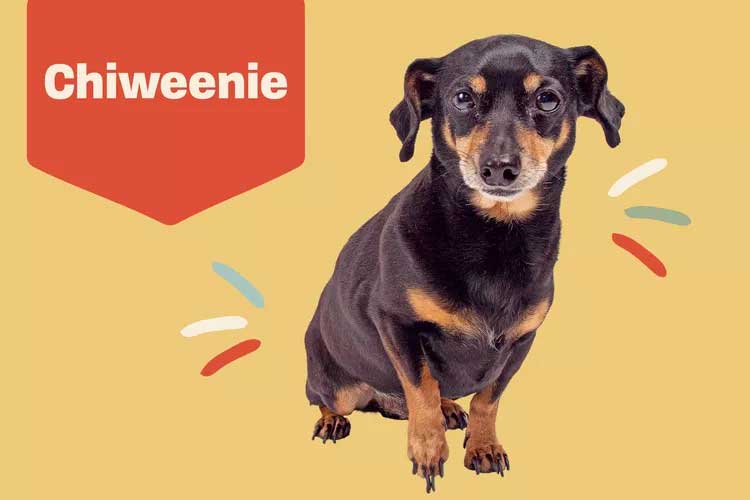Chiweenies are small dogs with big personalities. Their penchant for barking and need to be the center of attention can make them a handful, but with proper training they’ll be a lap dog for life.

Chiweenie Overview
| OFFICIAL NAME | Chiweenie |
| COMMON NAME | Chiweenie |
| PET HEIGHT | 6 to 10 inches |
| PET WEIGHT | 5 to 12 pounds |
| LIFESPAN | 12 to 16 years |
| GOOD WITH | cats, children, dogs, families, seniors |
| TEMPERAMENT | anxious, friendly, playful, timid, willful |
| INTELLIGENCE | medium |
| SHEDDING AMOUNT | infrequent |
| EXERCISE NEEDS | medium |
| ENERGY LEVEL | active |
| VOCAL LEVEL | frequent |
| DROOL AMOUNT | low |
| BREED GROUP | hybrid |
| BREED SIZE | small (0-25 lbs.) |
| COAT LENGTH | long, short, wiry |
| COLORS | black, brown / chocolate / liver, fawn, white |
| PATTERNS | bicolor, brindle, merle, sable |
| OTHER TRAITS | apartment-friendly, easy to groom, high potential for weight gain, strong loyalty tendencies |
You might call them chiweenies or choxies, but we call them adorable. In exchange for regular walks, bowls full of kibble, and lots of love, the dachshund and Chihuahua mixes known as chiweenies will play the role of loyal and affectionate lap dog. Little is known about how the breed originated—and chiweenies are still considered "designer dogs" and not a true breed—but one thing is clear: These pooches are popular.
True to their lineage, chiweenies, just like dachshunds and Chihuahuas, have strong personalities and develop deep bonds with their owners. Their main mission in life? To be the center of attention at all times.
Appearance
No two chiweenies look alike. Depending on the traits they inherit from their parents, chiweenies can have short legs, long bodies, erect ears, and bulging eyes, or long legs, short bodies, floppy ears, and overbites—or one of a dizzying number of combinations of these traits. Whether they resemble their mom or dad more, all chiweenies are petite, standing just 6–10 inches tall and weighing between 5–12 pounds.
Both dachshunds and Chihuahuas have two coat types: Smooth and long-haired, and dachshunds also have a wire-haired coat. Chiweenie fur can be in any of the three. Those with smooth coats typically shed less than those with wire or long-haired coats but are by no means considered "hypoallergenic." No matter the length or texture, coat colors can include white, tan, brown, and black; you can even find merle and brindle chiweenies. Smooth, tan-colored chiweenies are the most common, says Jennifer Gregory, vice president of Doxie by Proxy Rescue.
Temperament
Just as chiweenies differ in appearance based on their lineage, their temperaments differ, too. Dachshunds are known for being rather strong-willed, while Chihuahuas are best described as feisty (or "saucy"). Chiweenies can inherit any traits from their pup parents."Chiweenies will work in almost any family situation," says Catherine Gorton, founder of Texas Chihuahua Rescue. "They are happy-go-lucky dogs that offer the best of both breeds and make much better family dogs than Chihuahuas."

Gregory describes chiweenies as "small dogs with big dog personalities" who are steadfastly loyal and develop tight bonds with their owners. While the breed can be playful, affectionate, and cuddly lap dogs, chiweenies often reserve the sweeter side of their personalities for their owners. They tend to be suspicious of strangers, and may worry that their favorite toys, comfy bed, or yummy snacks will be kidnapped by these unfamiliar humans, Gregory says. Make sure to socialize your chiweenie early in life so he can learn to be comfortable around new people and in new situations.
Consistent positive reinforcement training and using rewards such as treats can help curtail any undesirable behaviors your confident chiweenie might develop. Thanks to their dachshund heritage, chiweenies can be spunky and strong-willed, and might resist being told what to do; keep training sessions short and fun to hold their attention.
Living Needs
For such a small dog breed, a chiweenie has big ideas about his living situation—and isn't afraid to let you know exactly what he wants. At the top of his list: Devoted owners who are committed to providing affection and making sure he's the center of attention.Despite their small size, not all chiweenies are well-suited to apartment life. Gregory describes them as "professional barkers" who will alert you to delivery trucks, passing neighbors, dogs barking in the distance, and strong winds (really). But remember: Each dog is an individual, and with proper training you can turn your chiweenie into a quiet gentleman who thrives as an apartment dweller and keeps peace with the neighbors.

Children might love the little chiweenie, but the affection isn't always mutual. Due to their small size, the breed can easily be accidentally injured, and sharing doesn't come naturally to these petite pooches. But most chiweenies will do well in a home with older children. If you're considering adopting a chiweenie, contact foster-based rescues to find a dog that will thrive in a busy home with small kiddos. As with any dog, always supervise playtime with kids, and teach your child how to properly interact with pets.
Chiweenies can also be picky about their four-legged friends. While some will happily share their homes with cats and other dogs, Gregory says others prefer to be the only pet at home. Typically, as with many breeds, chiweenies will do best with furry siblings when they're introduced in puppyhood.
And keep in mind: Dachshunds were originally bred as hunters, burrowing into underground tunnels in pursuit of badgers. Because of this, chiweenies might be prone to chase smaller animals—so they might not get along well in a home with bunnies, hamsters, or other little pets. This prey drive can mean squirrels are also a temptation just too great to resist, so make sure your chiweenie is on a leash or kept within a fenced-in yard when you take him outside.
Care
Gorton describes chiweenies as a "low maintenance and low shedding" breed. Smooth-coated chiweenies have "wash and go" coats that require minimal grooming; an occasional bath and brushing are all it takes to keep him looking his best. In colder climates, smooth-coated chiweenies—just like their two parent breeds—may need a stylish sweater or coat to keep them warm.Wire-haired or long-haired chiweenies also need occasional baths, but their coats will need more frequent brushing to prevent matting. Gregory advises brushing them a few times per week. Regardless of their coat type, all chiweenies need regular nail trims to keep them from click-clacking across the floor. And routine teeth brushing is essential, as these little guys can be prone to dental disease.
Despite being small enough to curl up in your lap, chiweenies won't want to stay there all the time. Both dachshunds and Chihuahuas like tagging along after their owners, often following them from room to room (and accidentally tripping you from time to time). Chiweenies have the same need to be part of the action.

You won't need to provide the same amount of exercise that active breeds like border collies or Labrador retrievers require, but your chiweenie will require daily walkies and regular playtime. Even a game of fetch or tug of war from your living room will keep him happy. "All dogs need jobs to do," Gorton says. "Walking challenges them mentally and, even if it's a short walk, sniffing and exploring wears them out."
Tired chiweenies will happily claim lap dog status and curl up for a long nap beside their favorite people.
Health
These small dogs have long lifespans, living 12–16 years. While mixed breed dogs are generally believed to have fewer health issues than purebred dogs, chiweenies are prone to some of the same health problems as their ancestors.Chiweenies, like dachshunds, are at risk for back issues like a degenerative spinal condition called intervertebral disc disease. A hardening of the intervertebral disc, a material that helps cushion the spaces between the discs, causes IVDD. The disease causes severe pain, impairs movement, and can lead to partial paralysis. In severe cases, surgery is the only treatment for IVDD.
"We see IVDD more often in chiweenies that have long backs like dachshunds," Gregory says.
The disease might not be an issue in chiweenies with Chihuahua-like bodies. Just like with dachshunds, keeping chiweenies' weight in check and not allowing them to jump on or off the furniture can minimize the risk of back injuries and IVDD.

Luxating patella is another health issue that's common in small breeds like the chiweenie. It's diagnosed when the kneecap moves out of its normal location, making it difficult for the dog to put weight on the affected leg.
Although a luxating patella often causes no pain—and some dogs learn how to kick out their leg so the kneecap moves back into place—more severe causes can cause chronic dislocation and increase the risk of other injuries such as torn cruciate ligaments. Surgery can help correct more severe or chronic cases.
Like all small dog breeds, chiweenies are also at high risk for dental disease. Bad breath, tartar buildup, and swollen, red gums are early signs of dental disease which, left untreated, increases the risk of infection. In addition to regular professional cleanings, Gregory says an at-home dental care program that includes dental chews and an at-home tooth brushing routine can help keep your pup's teeth looking (and smelling) fresh.
History
The chiweenie is a Chihuahua-dachshund hybrid and isn't recognized by the American Kennel Club as an official breed. Therefore, there isn't much documentation about their history.Gregory suspects that a dachshund and Chihuahua produced a litter of puppies that were so adorable, demand for the "breed" skyrocketed. These pups are the new dogs on the block, and their popularity has been growing over the last couple of decades.
Beware of "too good to be true" chiweenies, because many designer crossbreeds are the product of puppy mill schemes. This means they might not be born into a healthy environment that focuses on their well-being. Here are some warning signs of a potential puppy scam:
A website states specific wait times for puppies.
A breeder offers multiple mixed breeds for sale.
You're not allowed to visit the breeder, or don't receive satisfactory answers to your questions about their lines of dogs.
A breeder offers to ship puppies.
The breeder's website has vague contact information, such as no phone number, no email, doesn't offer video or in-person previews of your pup and her environment, and so on.
Fun Facts
A chiweenie named Tuna has 2.1 million followers on Instagram, where he shares pup-tastic pictures of his worldly adventures.Chiweenies are sometimes called "Mexican hot dogs" or "German tacos" because of the origins of the Chihuahua and the dachshund.